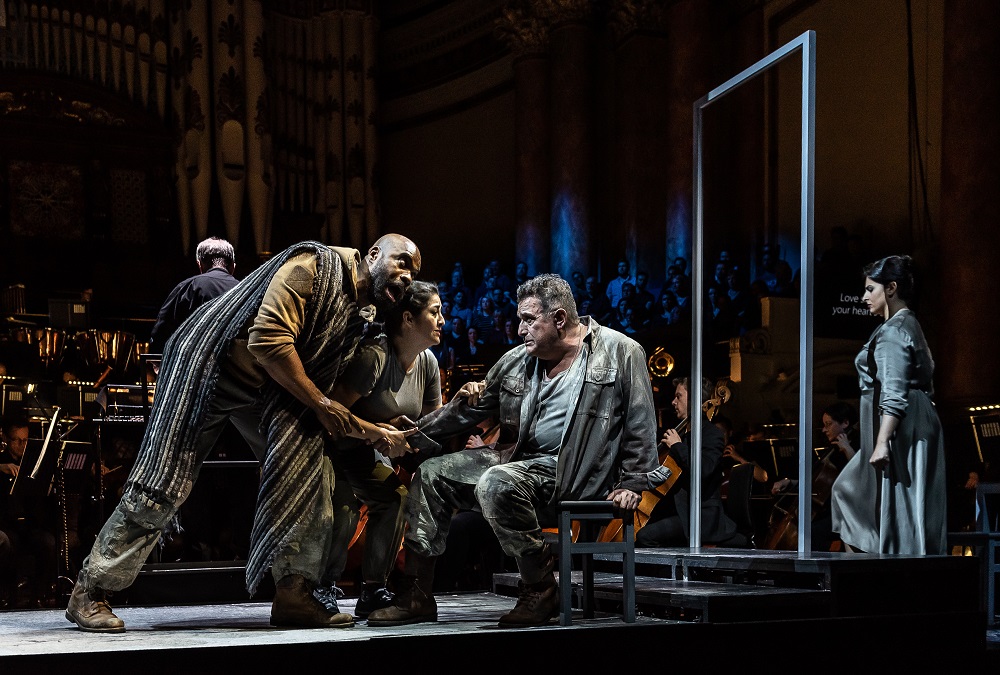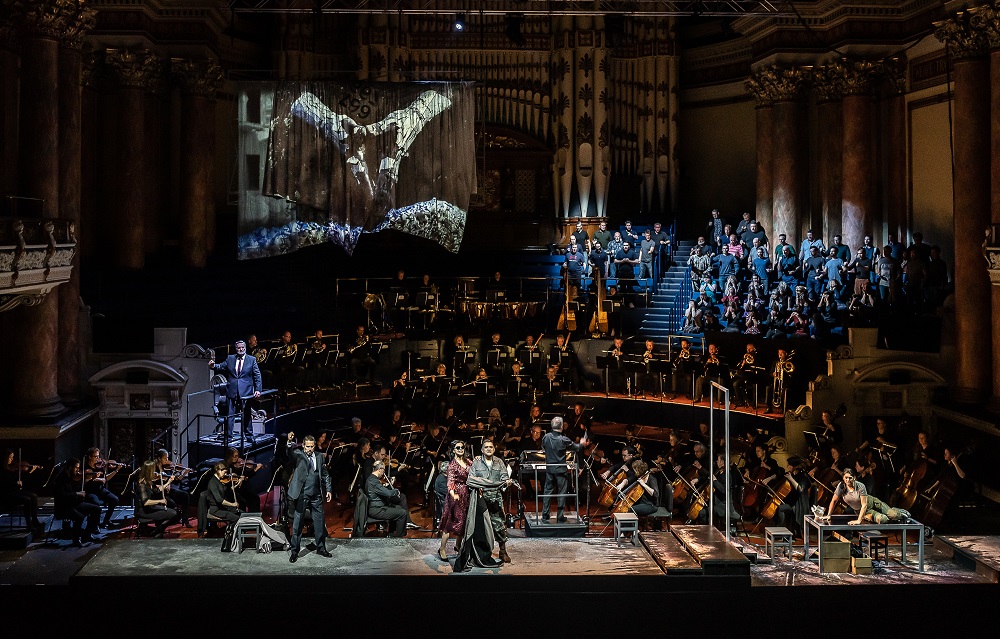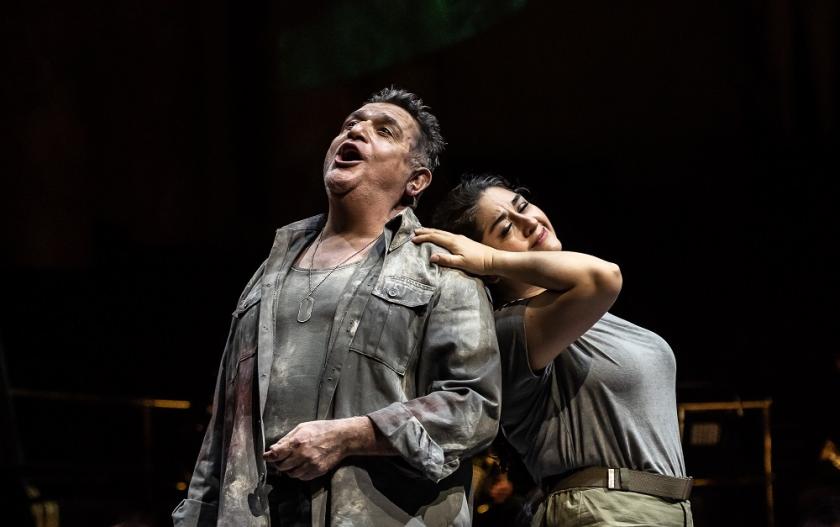Opera North created something approaching a new art form when they performed Wagner’s Ring in "concert stagings", putting their large orchestra in full view, with singers symbolically dressed and given limited front-of-stage space, and a continuous projected screen backdrop. That approach was also used for their Turandot two years ago, and now method and team are reunited as Sir Richard Armstrong conducts Aida with Annabel Arden as director and design by Joanna Parker.
The positives are considerable. Gone are conventional stage effects; instead, the performance is aurally stunning, with a symphony-sized orchestra on stage (and six of those ceremonial trumpets essential for the Grand March), a chorus of 60 or so, and some really big voices in the central roles. Armstrong draws wonderful sounds from all concerned, and the score sounds terrific, with the cimbasso lobbing explosions of tone into the audience like a mortar, and the strings creating a luxurious cushion of warmth for the voices.
Those voices are equal to the task, in particular the story’s two female love rivals, Aida (sung by Alexandra Zabala) and Amneris (sung by Alessandra Volpe), the slave girl and the princess each desperate for the affections of war hero Radamès (Rafael Rojas, pictured below in the centre with Eric Greene, Zabala anf Volpe). Both the women are making their debuts for Opera North and both are steeped in Italian tradition and able to act their roles as well as sing them – and to adapt to Annabel Arden’s conception of the piece, which places their two and three-person encounters of passion and jealousy in the very centre of the action, like TV close-ups.
Both the women are making their debuts for Opera North and both are steeped in Italian tradition and able to act their roles as well as sing them – and to adapt to Annabel Arden’s conception of the piece, which places their two and three-person encounters of passion and jealousy in the very centre of the action, like TV close-ups.
He – a well known figure with Opera North now – delivers the echoing top notes as Verdi no doubt intended and comes over as a genuinely conflicted personality (an aspect of the direction that is the key to its approach). "Celeste Aida" very near the beginning of the opera is an aria that tests every tenor who sings it, and Rojas sang with subtlety and admirably accurate tuning.
Petri Lindroos, as the chief priest Ramfis, is the other remarkable singer dominating the action, and he embodies the nasty side of human personality as a scheming politician. The other roles of the King (Michael Druiett), Aida’s father Amonasro (Eric Greene) and the Priestess (Lorna James) are also very well taken.
It’s the men in suits, fomenting wars for others to fight, whom we see as hateful in this presentation – and the chorus who represent not just the praying priesthood but also the baying crowd calling for vengeance and punching the air in their xenophobic hatred. You can see the parallels Annabel Arden is making with today’s Middle East and its destructive conflicts. Nothing is too closely modelled on recent history, but projected images of devastated buildings accompany much of the narrative.
She tells the tale as clearly as she can within the limitations of minimal props and no scenery – the essential backstory is mimed out during the prelude – but it has to be said that if you had no prior idea whatever of the plot this kind of staging could be a challenge.  No doubt most attenders will know what’s going on and will relish little touches such as Ramfis consulting his mobile phone, and the feeble King munching his sandwich when most needing to be regal. I found some aspects of the director and designer’s work to be rather too abstruse, in particular the visual themes of hands breaking out of clay moulds and lips breaking their silence, which form a large part of the projection sequence – the human conflicts and emotions portrayed in the foreground were so compelling one could easily forget the ‘ragged cloth’ screen altogether, and the shots of ruined buildings could have evoked a message enough on their own. The symbolic "door frame" indicating confinement for Aida and her father was strangely like an airport metal detector - unintended, no doubt.
No doubt most attenders will know what’s going on and will relish little touches such as Ramfis consulting his mobile phone, and the feeble King munching his sandwich when most needing to be regal. I found some aspects of the director and designer’s work to be rather too abstruse, in particular the visual themes of hands breaking out of clay moulds and lips breaking their silence, which form a large part of the projection sequence – the human conflicts and emotions portrayed in the foreground were so compelling one could easily forget the ‘ragged cloth’ screen altogether, and the shots of ruined buildings could have evoked a message enough on their own. The symbolic "door frame" indicating confinement for Aida and her father was strangely like an airport metal detector - unintended, no doubt.
There are some issues, given the concert hall setting: Leeds Town Hall is a mighty temple and not unlike the imagined ancient Egyptian settings the original scenario seems to have envisaged – but its acoustics do demand full-on down-the-line voice projection in a presentation such as this, which limits realism a little. Other stages may give more freedom. But the undeniable achievement of this interpretation of the opera is in the thought that Radamès is a broken man after his battle experience – his conflict is not just that of love triangle, or even affection versus duty, it’s a loss of faith.
It also gives a truly thrilling account of the music while simultaneously using its very pomp to subvert the militaristic values it might seem to embody. ‘Turning Aida on its head’ is avowedly what Arden and her colleagues are about here, and the bigger Armstrong’s paeans of sound became, the more hollow ‘patriotism’ seemed.















Add comment